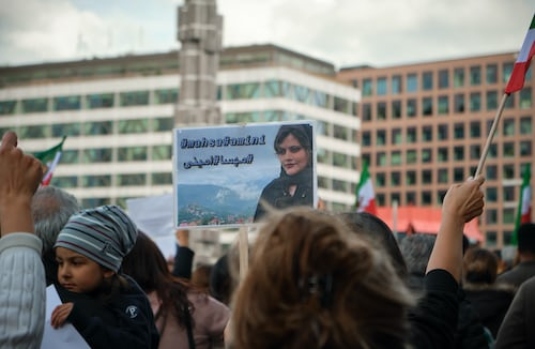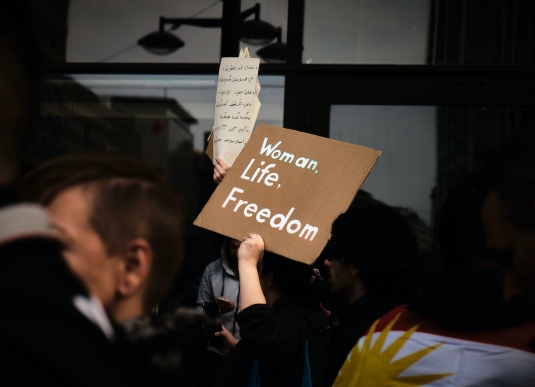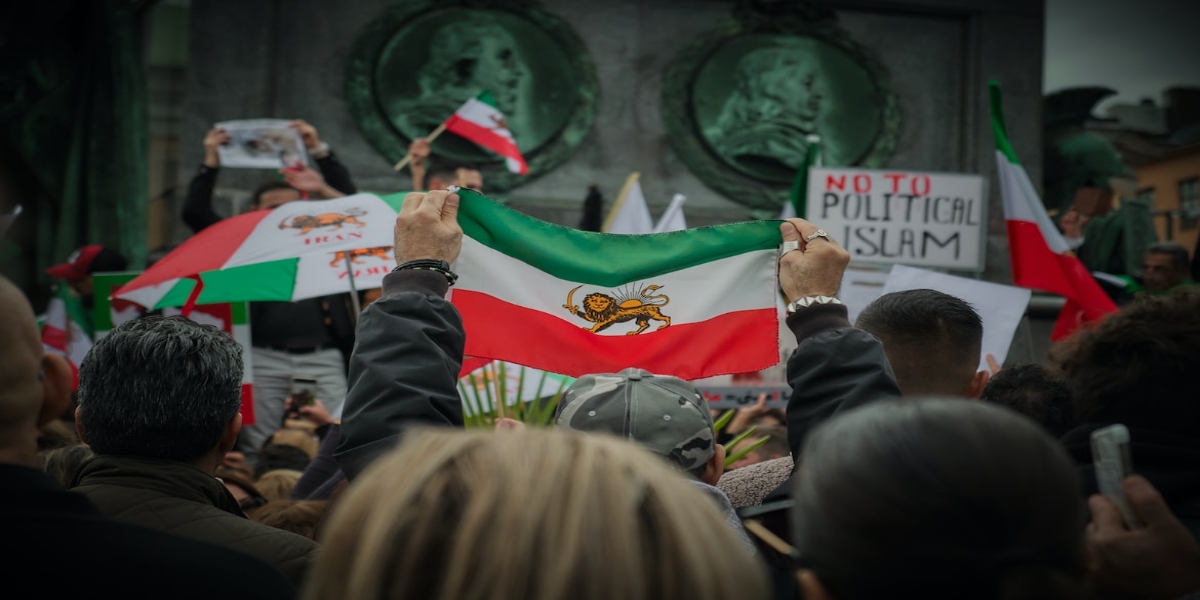The death of Mahsa Amini in September 2022 sparked worldwide protests in support of Iranian women’s rights and protestors’ rights, as well as global condemnation of Iran’s actions against its citizens.
Protests, such as this one in Stockholm, Sweden, have been held worldwide recently in solidarity with Iranians who are protesting against their national government. Photo courtesy of Artin Bakhan
__________________________________________________
According to AP News, Mahsa Amini, 22, was detained by the morality police, a division of Iran’s police force tasked with enforcing the country’s Islamic dress code, on Sept. 13 in Iran’s capital, Tehran, due to her allegedly loose headscarf, or hijab, a violation of the country’s strict Islamic dress code. After her arrest, Amini collapsed at a police station and died three days later. Arresting Amini for the dress code violation was excessive, and the morality police should have instead asked her to simply adjust her hijab to comply with the laws. Iranian authorities stated she died due to “sudden heart failure,” but her family said she had been in good health, and blamed her death on police mistreatment, according to BBC News. In the days and weeks following Amini’s death, protests broke out across Iran and the world, including London, New York, Paris, Rome and Sydney, using “Women, Life, Liberty” as their slogan, according to The Guardian. AP News also stated: “Many Iranians, particularly the young, have come to see Amini’s death as part of the Islamic Republic’s heavy-handed policing of dissent and the morality police’s increasingly violent treatment of young women.” Although the morality police, which is formally known as the Guidance Patrol, is supposed to enforce the country’s dress code laws for both men and women, in reality the force primarily targets women. The guidelines, which were created after the 1979 Islamic Revolution, do not specify what is considered “modest” and “immodest” clothing in the country, so citizens’ clothing is largely judged by the morality police officers’ personal interpretations. People detained by the morality police may be taken to detention centers to be given lectures on hijabs and Islamic values, and after the lectures they must call someone to bring them clothing that meets the dress code regulations in order to be released. While in custody, detainees may also be subject to physical abuse by their detainers. Many protestors see Amini’s death as the latest symbol of oppression and violence against women in Iran, and some are calling for the dismantling of the morality police. Those who are calling for the morality police to be dismantled or heavily reformed are correct, due to the violence and oppression the force brings against women. Citizens should not be physically punished for breaking dress code laws. Additionally, in order to enforce dress code laws, there should be specific guidelines to be followed and enforced. Laws should not be left open for subjective interpretations. All people in Iran, including visitors, must comply with the laws, regardless of their own beliefs. While it is customary for visitors to follow a country’s laws, it is unethical for a government to impose the regulations of a specific religion on people who do not practice that religion. Men are favored over women in domestic violence, divorce and child custody court cases, and women commonly face workplace and hiring discrimination. Additionally, women are banned from entering some fields of study and many public places such as men’s sporting events and stadiums. In rare acts of defiance, Iranian women have been protesting by taking off and waving their hijabs in public, and in some cases, women have burned their hijabs and cut their hair. Peaceful protestors should be able to voice their dissatisfaction with their government without being punished for their beliefs and actions. The purpose of a government is to serve its people, and it should be able to listen and adapt to the wants and needs of its people. The government’s response to the protests has been violent. CBS News reported on Nov. 8 that the death toll from the protests has topped 300, including 41 children and 24 women. Over 1,000 people have also been arrested in connection with protests, including several journalists. Journalists and other members of the press should not be arrested for doing their job, and should be able to freely report news without fear of punishment. Iran Human Rights, a Norway-based organization, accused the authorities of using excessive force, including live ammunition, against protestors, which is an international crime. The European Union and the U.S. have placed sanctions against Iran for its treatment of protestors, and the United Nations Human Rights Office also called for an end to the violence against peaceful protestors, demanding accountability for Amini’s death. Those who caused Amini’s death should be held accountable, as well as those who have brought death or harm to protestors. Countries should police each other in matters of human rights, and it is justifiable for other countries to condemn the Iranian government for its mistreatment of its citizens. The peaceful protests against Iran’s treatment of Amini are well-grounded. No government should force any particular religion or set of religious practices on its citizens, especially if those practices or laws cause harm to its citizens. While Iran has a large Muslim population, not all of its citizens identify as Muslim, and it cannot force all of its citizens to become Muslim. A person’s religious beliefs are a deeply personal and spiritual matter, and a government should not change a person’s religious identity by simply enforcing laws that align with a particular religion. Iranians should have a right to protest peacefully, and Iranian women should be granted the same freedoms and rights as men. All people should be able to make decisions for themselves, such as clothing, nutrition, family structure and home life, public places they visit and the fields of study they choose to enter. Practicing Muslims, along with people of other religious identities, should be able to make these decisions based on their own faith and beliefs rather than government regulations. Countries around the world should continue to hold or place additional sanctions against Iran, due to its ongoing mistreatment of its citizens, such as imposing visa and travel bans and freezing assets of Iranian authorities. Countries could also ban exported goods to Iran or imports from Iran, including banning or greatly reducing the amount of oil they buy from Iran. This will contribute to the erosion of Iran’s economy and place added pressure on Iranian officials to end the violence against protestors. Individuals can show support by raising awareness of the issues Iranians are facing, especially since the Iranian government has censored social media platforms in the country, therefore Iranians cannot freely voice opinions in support of the protests. If enough people around the world work together, we can enact change in Iran.

